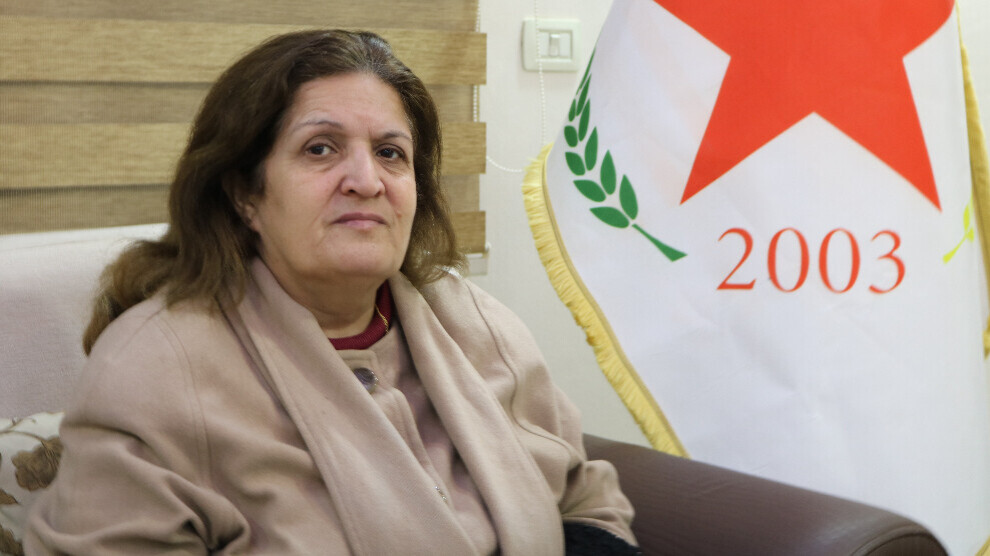PYD: Closing Sêmalka Border Gate harms people both in South Kurdistan and Rojava
PYD General Assembly member, Erîfe Bekir, said that Sêmalka Border Gate was closed at Turkey's request, and added that this situation harmed both Rojava and Bashur.
PYD General Assembly member, Erîfe Bekir, said that Sêmalka Border Gate was closed at Turkey's request, and added that this situation harmed both Rojava and Bashur.

The KDP administration closed Semalka Border Crossing on 16 December 2021, without the knowledge of the Kurdistan Regional Assembly. The Al-Walid Gate, 35 km from Semalka, was also closed. Al-Walid Gate was opened 4 years ago to allow the passage of materials such as cement and iron.
PYD General Assembly member, Erîfe Bekir, drew attention to the period when the Semalka Gate was opened and said: "The border gates were closed in Northern and Eastern Syria at the beginning of the revolution. Rojava was besieged. Semalka Gate was opened again in 2013. This gate was used to address the humanitarian problems and needs of the people here at that time. We see that this gate is closed from time to time due to party interests and political issues."
Ill people were passing through this border
Emphasizing that the authorities in the South repeatedly blocked and interrogated people at the border gates, Bekir stated that they even used the information of passers-by for intelligence and added: "The people of Rojava are often persecuted. This gate has been closed many times before. The last time it was closed, it was reopened upon the public's reaction. Most of the time, the border gate was also used for intelligence. An investigation was launched against the citizens crossing from Rojava to the South."
Erîfe Bekir said that many ill people also passed through Sêmalka Gate and continued as follows: "Many ill people from Rojava go to the South for treatment. But they are kept waiting at the border gate for days. People are prevented by the forces carrying out intelligence work there. Since many people in the Autonomous Administration cannot go to the region of the Damascus regime for security reasons, they want to settle their business in Bashur. But their names are sent to intelligence, they are questioned for days, and some are not even allowed to pass.
There is a dangerous and delicate situation right now. There is a lot of pressure on Rojava. The border gate is closed every few months. The aim is to cause problems to the people, to put people against the Autonomous Administration, and to force people to migrate. With the closing of the border gate, the activities of the Turkish MIT are also increasing. Turkey wants people to leave their lands and face difficulties in terms of life and economy. This is how they risk the lives of 5 million people in Rojava."
but their names are sent to the intelligence, they are questioned for days and some are not even allowed to pass.
There is a dangerous and delicate situation right now. There is a lot of pressure on Rojava. The door is closed every few months. The aim is to put people in trouble, to pit people against self-government, and to force people to migrate. With the closing of the door, the activities of the Turkish MIT are also increasing. In such a situation, they want people to leave their lands and face difficulties in terms of life and economy. This is how they risk the lives of 5 million people in Rojava."
Family cannot visit each other
Stating that many people moved to South Kurdistan due to the Turkish invasion and the attacks carried out by its mercenaries, Bekir said: "Many people immigrated from Rojava due to the attacks and occupation of Turkey and its mercenaries. Some family members had already moved to the South and some stayed in Rojava. Families want to visit each other but cannot go. There are 5 million people here, while 1 million people went to South Kurdistan. Closing the border gate also breaks family ties.
The economy is getting worse again. They did not leave Rojava any room to breathe. Sêmalka Border Gate gave Rojava a bit of air. It was the gateway to trade between Rojava and the South. The economy, life, health, are all under huge pressure. The people of Rojava are very affected by this process."
Border closed by request of the Turkish State
Erîfe Bekir also touched upon the efforts and negotiations to open the border gate, saying that "since the gate was closed, the PYD, PUK and non-governmental organizations have been working to reopen it again. Many officials from the Autonomous Administration have held talks, but so far there has been no response. "The excuses given for closing the door cause difficulties for people living in Rojava."
Turkey had a hand in getting the gate closed, said Bekir, adding that "Rojava is attacked every day and many parts of the Northern and Eastern areas of Syria are occupied. But Turkey still can't succeed. That's why it is making plans for a new invasion. One of these plans is to close the Semalka gate. The Kurdistan administration should not fall into this trap. The border gate was closed at Turkey's request. The protests by the revolutionary young people to support the mothers of martyrs should not be a reason for closing the border."
Bekir finally called on the Kurdistan administration and asked them not to fall into this trap.